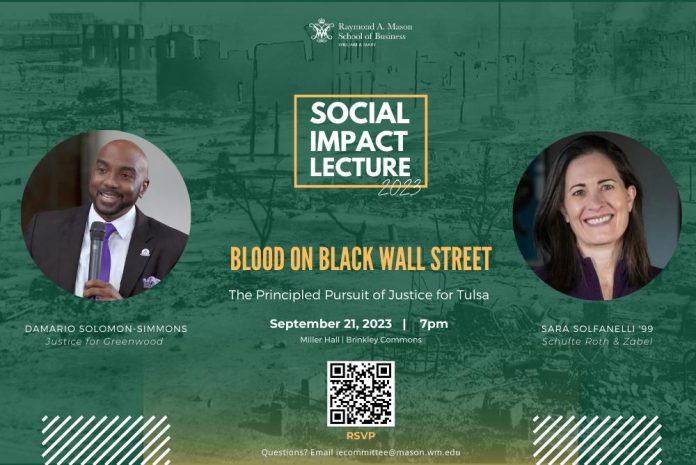Thursday, Sept. 21, the College of William and Mary hosted its 2023 Social Impact Lecture at the Raymond A. Mason School of Business. The event featured speakers Damario Solomon-Simmons and Sara Solfanelli ’99, who shared their work advocating for justice for the 1921 Tulsa Race Massacre victims.
According to Solomon-Simmons and Solfanelli, the 1921 massacre saw the destruction of almost 40 city blocks, leaving approximately 300 people dead, 3,000 missing and 8,000 homeless in a predominantly Black neighborhood in North Tulsa, Oklahoma, known as Greenwood. No one was held accountable for their crimes and the Black neighborhood was devastated, with little left to rebuild.
Solomon-Simmons is the founder, executive director and chairman of the board of Justice for Greenwood, an organization advocating for the Greenwood community, which fell victim to racially motivated violence during the Tulsa Race Massacre in 1921. He grew up in Tulsa in the same neighborhood where the massacre took place.
Solomon-Simmons and Solfanelli’s work centers around a current lawsuit attempting to seek justice for the three known remaining survivors of the massacre, 109-year-old Viola Fletcher, 108-year-old Lessie Benningfield Randle and 102-year-old Hughes Van Ellis. According to the Justice for Greenwood website, the lawsuit was filed Sept. 1, 2020, against the City of Tulsa and seven other defendants. It demands accountability and restitution for the 1921 massacre and the continued harm over the past 100 years.
During the lecture, Solomon-Simmons noted that he was unaware of the massacre until attending college, even though he lived amongst people back home in Tulsa who survived the massacre. From that point forward, Solomon-Simmons explained, he wanted to dedicate his life to bringing justice and awareness to the victims of the massacre.
Solfanelli, Special Counsel for Pro Bono Initiative at Schulte Roth and Zabel and a graduate of the College’s class of 1999, had a similar experience.
“When there are visitors, when there are classes that are talking about things that you might not actually know about and that seem like they might be kind of tough to learn about — do it,” Solfanelli said. “Show up and have the tough conversations and learn about things that you might wish you didn’t know existed in this world, because once you know they exist, you can’t unknow that.”
As an American Studies major at the College, Solfanelli mentioned that she did not remember learning about the Tulsa Race Massacre in her classes. She was first exposed to the tragedy during the COVID-19 pandemic and the 2020 Black Lives Matter protests, when she believes many people across the country began to reckon with the United States’ racist past.
“When there are visitors, when there are classes that are talking about things that you might not actually know about and that seem like they might be kind of tough to learn about — do it,” Solfanelli said. “Show up and have the tough conversations and learn about things that you might wish you didn’t know existed in this world, because once you know they exist, you can’t unknow that.”
Over 100 students attended the lecture, which was followed by a question-and-answer session. Several student questions touched on the impact of new laws limiting instruction of African-American history in states like Florida on the goals that Solomon-Simmons, Solfanelli and their team are trying to accomplish.
Janeé Thomas ’24, who attended the event, mentioned the value of interdisciplinary and diverse learning.
“William and Mary is privileged to be a liberal arts university, so every student should take that as an opportunity to learn as much as they can and diversify their education because a knowledgeable citizen is a helpful citizen,” Thomas said.
Solomon-Simmons and Solfanelli noted that Solfanelli’s law firm, Schulte Roth and Zabel, has contributed significantly to the work of Justice for Greenwood. The large corporate firm is not typically known for its work in civil rights law but jumped at the opportunity to participate in this project. Solfanelli mentioned that many people in her firm view it as a professional and personal responsibility to use the firm’s vast resources to fight for civil rights.
Currently, Solomon-Simmons, Sofanelli and their team are pursuing three avenues for justice. First, as mentioned above, they are filing a lawsuit to seek legal justice through the court system. Second, they are advocating for community awareness by speaking at events, like the one hosted at the College, and to the press to gain national support. Third, the team has petitioned the U.S. Department of Justice to open an investigation into the massacre.
“I think I’m most proud that I haven’t quit,” Solomon-Simmons said. “I mean, honestly, because we’ve taken a lot of losses along the way in courtrooms and the legislative halls and losing clients and different folks. So, I’m just proud that I still have a community that wants justice and to keep moving. I’m proud of continuing the legacy and those who fought starting on June 1, 1921. I stand on the shoulders of so many warriors.”

